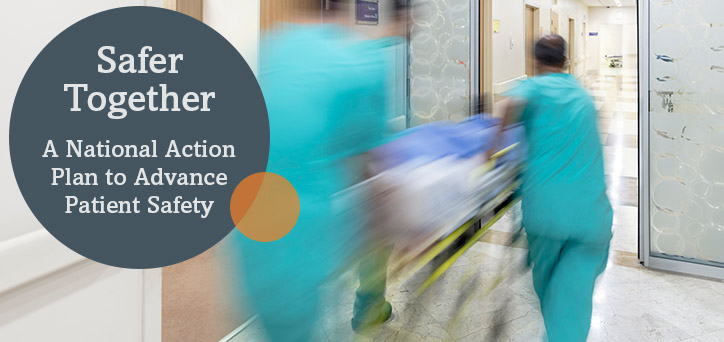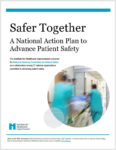
Plan reflects consensus on need for greater collaboration and greater focus on foundational change to reduce medical errors
Boston, MA — OpenNotes joined other members of the Institute for Healthcare Improvement (IHI)-convened National Steering Committee for Patient Safety (NSC) to announce the release of a National Action Plan (NAP) intended to provide health systems with renewed momentum and clearer direction for eliminating preventable medical harm. Safer Together: A National Action Plan to Advance Patient Safety draws from evidence-based practices, widely known and effective interventions, exemplar case examples, and newer innovations. The plan is the culmination of 27 organizations including: influential federal agencies, safety organizations and experts, and patient and family advocates, first brought together in 2018 by IHI, a global leader in health and health care improvement worldwide.
The knowledge and recommendations in the National Action Plan center on four foundational areas deliberately chosen because of their widespread impact on safety across the continuum of care:
- Culture, Leadership, and Governance: The imperative for leaders, governance bodies, and policymakers to demonstrate and foster deeply held professional commitments to safety as a core value and promote the development of cultures of safety.
- Patient and Family Engagement: The spread of authentic patient and family engagement; the practice of co-designing and co-producing care with patients, families, and care partners to ensure their meaningful partnership in all aspects of care design, delivery, and operations.
- Workforce Safety: The commitment to the safety and fortification of the health care workforce as a necessary precondition to advancing patient safety; the need to work towards a unified, total system perspective and approach to eliminate harm to both patients and the workforce.
- Learning System: The establishment of networked and continuous learning; forging learning systems within and across health care organizations at the local, regional, and national levels to encourage widespread sharing, learning, and improvement.
“The National Action Plan’s recommendations for sharing visit notes with patients and their care partners come at a time when federal rules will enable widespread transparency, and can catalyze more meaningful engagement, as urged by safety experts,” said Sigall Bell, MD, Director of Patient Safety and Discovery for OpenNotes at Beth Israel Deaconess Medical Center, and who served on the Patient and Family Engagement subcommittee of the NSC. “Open notes are one step, among several, that organizations can meaningfully take and assess with the help of the NAP and its implementation guide.”
To help health care organizations immediately act on the recommendations and achieve progress across the four foundational areas, the plan provides implementation tactics, case examples, tools, and resources—including two supplementary materials:
- Self-Assessment Tool assists leaders and organizations in deciding where to start on their respective work and is designed to allow organizations to track progress over time.
- Implementation Resource Guide details tactics and supporting resources for implementing and measuring the National Action Plan recommendations.
“We are proud to have joined with the 26 other organizations who contributed to this National Action Plan, that brought together patients, families, clinicians, and researchers to create a roadmap to improve healthcare and patient safety,” Bell added. “It’s been an honor to work alongside such dedicated individuals, and I am excited about this comprehensive, organized resource which is the product of an enormous effort by scores of individuals and organizations. These evidence-based and morally imperative guidelines respect patients and families and better support clinicians in their work.”
“The way in which diverse groups and patient advocates who are interested in patient safety came together to forge the National Action Plan is unprecedented, and it underscores the necessity to work together to create the safest health care possible,” said NSC Co-Chair Jeffrey Brady, MD, MPH, who directs the Center for Quality Improvement and Patient Safety at the U.S. Agency for Healthcare Research and Quality. “Over the past 20 years, the field has amassed a tremendous body of knowledge to improve health care safety. What’s been missing is the use of this knowledge for more coordinated action. That’s what we want to rectify.”
“With so many competing priorities and requirements that health systems face, it has become difficult to focus on key areas that are foundational for improving across the board,” stated Tejal K. Gandhi, MD, MPH, CPPS, NSC Co-Chair, IHI Senior Fellow, and Chief Safety and Transformation Officer at Press Ganey. “The Action Plan helps direct attention to these interdependent areas, which have substantial, wide-ranging influence on many aspects of patient safety. Accelerating improvement in each of these areas will mutually support improvement in others and create the fertile soil that allows broader safety initiatives to take root and be cultivated.”
About OpenNotes
OpenNotes, based at the Beth Israel Deaconess Medical Center in Boston, a major Harvard Medical School teaching hospital, studies the effects of shared clinical notes on patients, care partners and clinicians, and disseminates its findings. OpenNotes works with collaborators around the country and overseas to foster and evaluate the spread and implementation of shared clinical notes (“open notes”). OpenNotes does not develop software and is not a technology company. It is funded entirely by federal and philanthropic grants and gifts. To learn more, visit www.opennotes.org.





You must be logged in to post a comment.